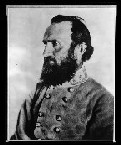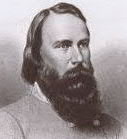 Bios: Fremont, McCullochs, Huger, Clayton, and Clingman - 3/8/2007 12:20:53 AM
Bios: Fremont, McCullochs, Huger, Clayton, and Clingman - 3/8/2007 12:20:53 AM
|
|
|
tdean001
Posts: 12
Joined: 3/4/2007
Status: offline

|
Major Gen. John Charles Fremont (b. 1813, d. 1890). Born in Savannah, Georgia, General Fremont led an exciting life prior to the Civil War. Fremont got his start leading expeditions in the American West, where he participated in the surveying of land. His exploits were well-documented and he was revered nationally as the “Pathfinder”. In 1846, Fremont was appointed Lieutenant Colonel of the US Mounted Rifles and participated in the Mexican-American War in numerous battles for California. After the war, he was appointed the military governor for the territory of California. He also served as Senator from the newly-formed state of California for one year. In 1856, he was nominated as the first Republican Party candidate for President, but lost to Democrat James Buchanan. At the outset of the Civil War, Fremont was appointed Major General and placed in the command of the Department of the West by Lincoln. His forces experienced numerous failures under his command, including losses at the battles of Wilson's Creek and Liberty that summer. After imposing martial law in Missouri, Fremont proceeded to confiscate secessionists' private property and slaves. This proclamation was eventually rescinded by Lincoln and Fremont was then relieved of his command on November 2nd, 1861. Facing more political pressure, Lincoln reappointed Fremont in March 1862 as the commander of the Mountain Department of West Virginia. Facing off against General Stonewall Jackson in the Shenandoah Valley, Fremont suffered numerous losses. Once his command was placed under once-subordinate John Pope's command, Fremont resigned. A split within the Republican Party gave Fremont another opportunity to run for President in 1864 as the leader of the Radical Republicans. After reconciling their differences with their parent party, the Radical Republicans folded before the election.
Leadership:
Tactics:
Initiative:
Command:
Cavalry:
Brigadier General Benjamin McCulloch (b. 1811, d. 1862). Born in Tennessee, McCulloch received no formal education (military or otherwise) as a child. He was, however, heavily influenced by one of his family's neighbors, David Crockett. When Crockett left for Texas in 1835, McCulloch intended on accompanying him, but he developed measles and was unable to follow. After the fall of the Alamo, McCulloch joined the Texas Army and served as an enlisted man in an artillery company. He received a battlefield commision as a first lieutenant. He became a land surveyor for the Republic of Texas and developed a reputation as an Indian fighter. This led to his election to the Texas House of Representatives in 1839. During the campaign, McCulloch participated in a duel with his opponent and was shot in his right arm, leaving it crippled for life. He served as a scout for the Texas Rangers during the war with Mexico and was promoted to Major. He joined the Gold Rush to California after the war. After Texas seceded from the Union on February 1st, 1861, McCulloch was commissioned in the Confederate Army as a colonel. Immediately, McCulloch organized the surrender of all the Federal property in San Antonio. He was subsequently promoted to brigadier general on May 11th, 1861. He was placed in command of the Indian Territory and formed the piecemeal Army of the West. He led a decisive victory for the Confederates at the Battle of Wilson's Creek. On March 7th, 1862, at the Battle of Pea Ridge, Arkansas, General McCulloch was shot out of the saddle while scouting ahead of his main force. Brigadier General James McIntosh was shot and killed moments later while trying to retrieve McCulloch's body.
Leadership:
Tactics:
Initiative:
Command:
Cavalry:
Major General Benjamin Huger (b. 1805, d. 1877). A Charlestonian from a family with a long-standing military heritage, Huger attended the US Military Academy at West Point and graduated in 1825. Huger served as chief of ordnance for Winfield Scott during the Mexican-American War, being promoted to colonel during the conflict. At the onset of the Civil War, Huger was commissioned a colonel of artillery in the Confederate Army. He was assigned to command the Department of Norfolk. For his service, he was promoted to major general on October 7th, 1861. During the Peninsula Campaign, Huger ordered the destruction of the Norfolk naval works and the dismantling of the CSS Virginia before withdrawing. His forces on Roanoke Island were then captured by Union soldiers, but he was released. His actions were subsequently reviewed by a congressional inquiry and he was assigned a division command in the Army of Northern Virginia under General Joseph Johnston. His tendencies on the battlefield were reviewed by both the congressional inquiry and by General Robert E. Lee, and he was found lacking the aggressiveness that Lee sought in his commanders. He was relieved of his command on July 12th, 1862. Huger continued to serve the Confederacy as Inspector General of Artillery and Ordnance and also as the Chief of Ordnance for the Trans-Mississippi Department for the remainder of the war. He retired after the war to be a farmer in Virginia and North Carolina, finally returning to Charleston to pass away in 1877.
Leadership:
Tactics:
Initiative:
Command:
Cavalry:
Major General Henry DeLamar Clayton (b. 1827, d. 1889). Born and raised in Pulaski county, Georgia, Clayton attended the Emory and Henry College in Virginia before studying law. He began a law practice in Alabama in 1849 and was elected to the state legislature in 1857. He also commanded a volunteer regiment of Alabaman militiamen as a colonel during this time. At the outbreak of hostilities, he urged Governor Moore to allow him to command his regiment, and he was sent to Pensacola. He remained there for the better part of a year, before the 39th Alabama regiment was organized. He was named colonel of this new regiment and they served in the Kentucky campaign and also at Murfreesboro, where he was severely wounded. After their distinction at Murfreesboro, Clayton was then promoted to brigadier general. His brigade served conspicuously well in Chickamauga, Dalton, and the battles for Atlanta. After the Atlanta campaign, Clayton was promoted to major general on July 7th, 1864, replacing A.P. Stewart in command. The division fought in the Tennessee campaign with distinction and helped cover the retreating Confederate army after their defeat at Nashville. After the surrender of the Confederacy, Clayton returned to a life of planting. He was elected circuit court judge in 1866, but was removed because of the reconstruction acts passed by Congress. He continued to practice law and farm until the time of his death, in Alabama, at the age of 62.
Leadership:
Tactics:
Initiative:
Command:
Cavalry:
Brigadier General Thomas Lanier Clingman (b. 1812, d. 1897). Clingman was born in western North Carolina, at the base of the Brushy Mountains. After receiving an extensive private education, Clingman attended the University of North Carolina, Chapel Hill. He graduated and began studying law. After his admission to the bar in 1834, he practiced in Hunstville, NC. He served in the North Carolina House of Commons for 5 years before being elected a state senator. Clingman ran as a Whig for election to the US Congress in 1843 and was elected, only to be defeated as an incumbent representative in 1845. That same year, he fought a duel with fellow Southern representative William Lowndes Yancey. Neither congressman was injured. He was reelected in 1847 and served for the next 11 years before resigning, one day after being elected as a Democratic US Senator. His tenure as a Senator was cut short with his expulsion from the Senate after North Carolina's secession from the Union. Upon returning to North Carolina, he was commissioned into the Confederate Army as a colonel commanding the 15th North Carolina infantry regiment. They served in the defense of coastal regions of both North and South Carolina. Clingman was promoted to brigadier general on May 17th, 1862 and placed in charge of what came to be known as Clingman's Brigade. During the War, Clingman and his troops served throughout the regions of the Southern Atlantic coast. They repulsed the 54th Massachusetts Volunteer Infantry at Fort Wagner. Additionally, they served at Cold Harbor and the Richmond-Petersburg Campaign. After the surrender of the Confederacy, Clingman helped survey the mountains of eastern Tennessee and North Carolina. The highest mountain in North Carolina is named Clingman's Dome, in his honor.
Leadership:
Tactics:
Initiative:
Command:
Cavalry:
Brigadier General Henry E. McCulloch (b. 1816, d. 1895). Henry McCulloch was born in Rutherford County, Tennessee as one of 12 children. He was influenced at a young age by the teachings of Sam Houston and David Crockett, who were neighbors and acquaintances of the McCulloch family. After traveling to San Antonio with his brother in 1838, he worked as a surveyor and Indian-fighter. He was a member of the Gonzales Rangers and, in 1839, was elected to the Republic of Texas House of Representatives. After his brother was crippled in a duel with political rival Reuben Ross, Henry challenged Ross to a duel and killed him. During the Mexican-American War, McCulloch commanded a company of volunteers. During the intervening peacetime, he served as a legislator in the state legislature and also as a US marshal. After secession, McCulloch was commissioned as a colonel in command of the 1st Texas Mounted Rifles. He was well-known and respected for the discipline with which he maintained his regiment of cavalry. After the attack on Fort Sumter, McCulloch mobilized 5 companies of troops to ensure the surrender of the Union forces remaining in Texas. He also helped stabilize the border with the Wichita and Caddo Indians and met with great success. He was promoted to brigadier general in September 1861 and commanded the Western Military District in southwest Texas. He was then assigned to the third brigade of the Texas Division and saw action in the Red River Campaign and the Vicksburg Campaign. He was relieved of his command in July of 1863 and returned to Texas to continue work with the Western Sub-District of Texas, where he maintained the border with the Indians and rounded up deserters. After the war ended, he served as the superintendent of the Texas School for the Deaf for five years before retiring. He passed away in 1895. Ben and Henry McCulloch were the only Confederate brothers who both served as generals.
Leadership:
Tactics:
Initiative:
Command:
Cavalry:
|
|
|
|
 Printable Version
Printable Version









 New Messages
New Messages No New Messages
No New Messages Hot Topic w/ New Messages
Hot Topic w/ New Messages Hot Topic w/o New Messages
Hot Topic w/o New Messages Locked w/ New Messages
Locked w/ New Messages Locked w/o New Messages
Locked w/o New Messages Post New Thread
Post New Thread